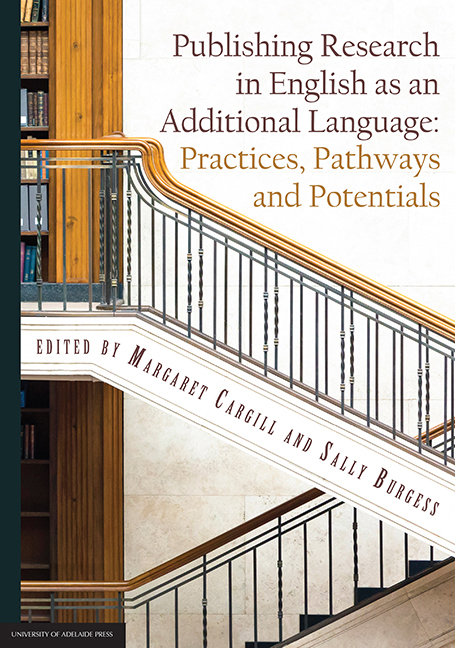Book contents
- Frontmatter
- Contents
- List of contributors
- Acknowledgements
- Foreword
- Introduction: Unpacking English for Research Publication Purposes [ERPP] and the intersecting roles of those who research, teach and edit it
- 1 Accept or contest: A life-history study of humanities scholars’ responses to research publication policies in Spain
- 2 Introducing research rigour in the social sciences: Transcultural strategies for teaching ERPP writing, research design, and resistance to epistemic erasure
- 3 Blurring the boundaries: Academic advising, authors’ editing and translation in a graduate degree program
- 4 The delicate art of commenting: Exploring different approaches to editing and their implications for the author-editor relationship
- 5 The CCC Model (Correspondence, Consistency, Correctness): How effective is it in enabling and assessing change in text-editing knowledge and skills in a blended-learning postgraduate course?
- 6 How credible are open access emerging journals? A situational analysis in the humanities
- 7 Disseminating research internationally: Intra-subdisciplinary rhetorical structure variation in immunity and allergy research articles
- 8 Scientists publishing research in English from Indonesia: Analysing outcomes of a training intervention to inform institutional action
- 9 ‘The one who is out of the ordinary shall win’: Research supervision towards publication in a Chinese hospital
- 10 The geopolitics of academic plagiarism
- 11 Training ‘clerks of the [global] empire’ for 21st-century Asia? English for Research Purposes (ERP) in Vietnam
- 12 Standardisation and its discontents
- Reflections and future directions in publishing research in English as an Additional Language: An afterword
10 - The geopolitics of academic plagiarism
Published online by Cambridge University Press: 16 March 2018
- Frontmatter
- Contents
- List of contributors
- Acknowledgements
- Foreword
- Introduction: Unpacking English for Research Publication Purposes [ERPP] and the intersecting roles of those who research, teach and edit it
- 1 Accept or contest: A life-history study of humanities scholars’ responses to research publication policies in Spain
- 2 Introducing research rigour in the social sciences: Transcultural strategies for teaching ERPP writing, research design, and resistance to epistemic erasure
- 3 Blurring the boundaries: Academic advising, authors’ editing and translation in a graduate degree program
- 4 The delicate art of commenting: Exploring different approaches to editing and their implications for the author-editor relationship
- 5 The CCC Model (Correspondence, Consistency, Correctness): How effective is it in enabling and assessing change in text-editing knowledge and skills in a blended-learning postgraduate course?
- 6 How credible are open access emerging journals? A situational analysis in the humanities
- 7 Disseminating research internationally: Intra-subdisciplinary rhetorical structure variation in immunity and allergy research articles
- 8 Scientists publishing research in English from Indonesia: Analysing outcomes of a training intervention to inform institutional action
- 9 ‘The one who is out of the ordinary shall win’: Research supervision towards publication in a Chinese hospital
- 10 The geopolitics of academic plagiarism
- 11 Training ‘clerks of the [global] empire’ for 21st-century Asia? English for Research Purposes (ERP) in Vietnam
- 12 Standardisation and its discontents
- Reflections and future directions in publishing research in English as an Additional Language: An afterword
Summary
Just how serious an offence is academic plagiarism?
Judging by the ominous warnings issued to students by universities in the Anglo-Saxon world (Abasi & Graves, 2008) and the sense of moral outrage with which transgressors are pursued (Pennycook, 1996; Martin, 1994), the answer to that question would seem to be ‘very serious indeed’. In fact, the University of Oxford's website (n.d.) is unequivocal on the matter:
It would be wrong to describe plagiarism as only a minor form of cheating, or as merely a matter of academic etiquette. On the contrary, it is important to understand that plagiarism is a breach of academic integrity.
Consequently, those found guilty of ‘committing’ plagiarism (the collocation is significant) face the most severe penalties that academia can muster: expulsion, disgrace and, in extreme cases, even prosecution under the Copyright Act.
Yet in many other countries of the world, plagiarism, like other forms of academic corruption, is not viewed with quite the same degree of opprobrium. Gadpaille (2004, p. 57) reports that, in the unspecified Central European country where she worked, not only was cheating endemic in the culture, no shame seemed to accrue to the practice; instead, ‘information is widely viewed as common property; honour lies in sharing rather than monopolizing, and competition for grades is minimal’. Similarly, Sherman (1992, p. 191) found that first-year students in an Italian university gave verbatim answers without any kind of analysis or sourcing, clearly viewing this as ‘not only legitimate but correct and proper’; while Deckert (1993) claimed that the Chinese students in his study routinely engaged in a form of ‘learned plagiarism’ (p. 95), which involved, amongst other things, rote memorising and recycling (p. 140).
Clearly, then, there is a cultural dimension to plagiarism that urgently needs to be addressed in the increasingly globalised world of modern academia.
Attitudes towards authorship, originality and intellectual property have not always been what they are today (Randall, 2001; Kewes, 2003; Love, 2003). In mediaeval Scholasticism, the term ‘author’ (auctor) was reserved for those ancient authorities that had produced great truths in accordance with Christian doctrine, and contemporary writers, considered mere scriptores, compilatores or commentators2, were expected to copy them as faithfully as possible for the purpose of dissemination.
- Type
- Chapter
- Information
- Publishing Research in English as an Additional LanguagePractices, Pathways and Potentials, pp. 209 - 220Publisher: The University of Adelaide PressPrint publication year: 2017



